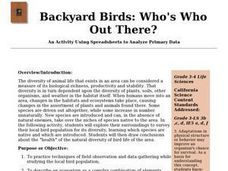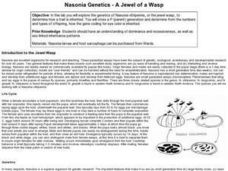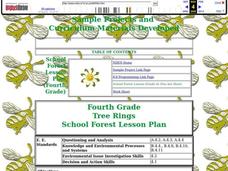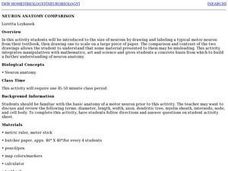Curated OER
Maine Black Bear Research and Field Study Activity
Young scholars participate in a field study of Maine Black Bears. They first do academic research on the Maine Black Bear. Following extensive research and discussion, students go out into the field with Maine State Biologist to observe...
Curated OER
Trophic Ecology of Humans
students analyze the place of humans among the tropic levels by observing what we eat. They calculate the caloric content of several foods commonly eaten by humans and calculate the total energy cost to grow, process, transport, store...
Curated OER
Stomata: Microscopic Openings that Let Plants Breathe
Young scholars participate in a lab experiment to observe and measure the opening and closing of stomata. They focus on photoperiod, locate and identify stomata on a leaf and explain the role of stomata in the daily functioning of a plant.
Curated OER
Backyard Birds: Who's Who Out There?
Young scholars practice techniques of field observation and data-gathering while studying local bird population, describe ecosystem as complex combination of elements, which can affect or be affected by each other, and determine effects...
Curated OER
Hatching chickens
Students recognize the need for gentle care of eggs. In this chicken hatching instructional activity, students observe the process of incubating eggs for hatching. Students find the materials needed to properly care for the chicks....
Curated OER
Digital Mitosis and Claymation
Take mitosis and meiosis out of the biology textbook and onto the screen! An innovative class project prompts young biologists to create an animation movie using clay, showing the phases involved in mitosis or meiosis by...
Curated OER
"You may now enter the Holodeck."
Students study and make a hologram. In this holography mini-unit, students study the science behind holography and in the culminating activity they create their own holograph. This mini-unit includes six lessons and a culminating activity.
Curated OER
Seasonal Cloud Cover Variations
Students, in groups, access data from the NASA website Live Access Server regarding seasonal cloud coverage and the type of clouds that make up the coverage. They graph the data and make correlations between types, seasons and percentages.
Curated OER
Photosynthesis Explored
Students observe the production of gas as an effect of photosynthesis. For this biology lesson, students perform an experiment with pondweed and make measurements and predictions about photosynthesis and the plant.
Curated OER
Environment: The River Classroom
Seventh graders engage in hands-on experiments and activities dealing with rivers and greenways. They also observe lectures and demonstrations by experts in water and river restoration. Students and teachers participate in canoe trips...
Curated OER
Magnificent Microscopes
Students use a microscope in a series of activities that are designed to help them explore the "invisible world" and make meaningful microscopic discoveries and learn the importance of the microscope as a tool in science and research.
Curated OER
Understanding How Potatoes Grow
Second graders make a KWL chart and brainstorm what they need for the project of growing potatoes. They choose one potato and plant it in water or peat moss cups and choose a location in which meets the needs of the plants and make their...
Curated OER
Seed Dispersal
Young scholars determine seed dispersal methods. In this life science lesson plan, students make predictions about how seeds might move, then look at seeds under micrographs or microscopes to analyze the seed coat and how this helps...
Curated OER
Nasonia Genetics-A Jewel of a Wasp
High schoolers investigate the inheritance pattern of eye color in Nasonia wasps. For this genetics and inheritance lesson plan, students read about the life cycle of Nasonia wasps and hypothesize about the possibilities of eye color...
Curated OER
Protozoans
For this protozoans worksheet, students observe pond water using a microscope to identify the four classes of single-celled organisms including sarcodines, ciliates, flagellates and sporozoans.
Curated OER
Tree Rings
Fourth graders explore tree rings. In this plant biology lesson plan, 4th graders construct a KWL chart on tree rings and examine real tree rings. Students identify the changes that happened during the tree's life and its actual age....
Curated OER
Water filtration with Plants
Sixth graders explain how soil and plants effect contaminated water in nature. In this filtration instructional activity, 6th graders work in groups to test biofiltration units. Students determine which biofiltration units work...
Curated OER
What Does it Take to be a Survivor? Part One
Students explore marine animal adaptation. In this introductory ocean life biology lesson, students access prior knowledge by participating in a whole class "thought swap." Students form two lines, respond to a prompt from the teacher...
Curated OER
WET Science Lesson #3: Comparison of Aquatic and Terrestrial Plants
Elementary life science explorers compare and contrast aquatic and terrestrial plants (elodea and soybeans) in a Venn diagram. Some background information is provided to support direct instruction, and general instructions are provided...
Curated OER
Organisms and Their Environment
Students observe elements of a local ecosystem and gain an understanding of what elements make up an ecosystem. For this ecosystem lesson students create a class food web that shows the interactions among the elements of the...
Curated OER
Basic Needs of Plants
Fourth graders explore the four basic needs of plants. They examine plants as they grow. Students discuss the changes that they see in the growing plants. They observe what happens to a plant when one of its basic needs is taken away.
Curated OER
Neuron Anatomy Comparison
Pupils create a scale model of a motor neuron that is two hundred times larger than the actual neuron. They identify the structures of a neuron and observe neurons under the microscope then use a worksheet to convert actual sizes into...
Curated OER
Water and Diffusion
In this water and diffusion worksheet, students will explore the characteristics of water and the water molecule. Students will also answer questions about diffusion and the movement of materials due to concentration differences. This...
Curated OER
How Many Drops?
Students conduct a simple test to determine how many drops of each of three liquids can be placed on a penny before spilling over. They come up with an explanation for their observations about different amounts of liquids a penny can hold.

























